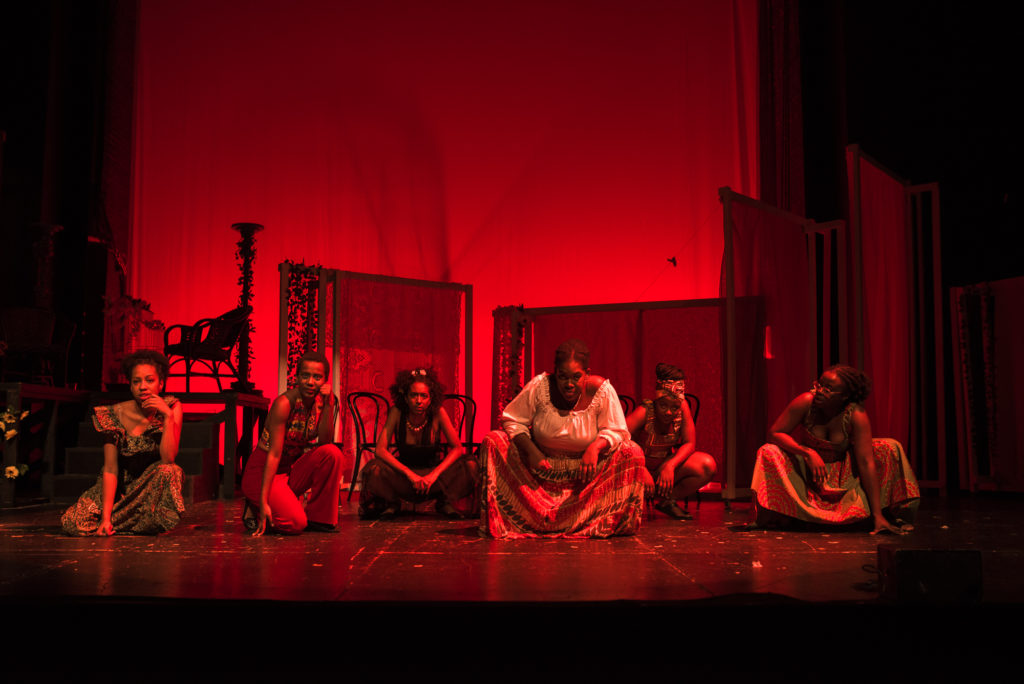
The founding women of the Washing Society are dancing, laughing, and singing. A folk song streams through the theatre like fingers smoothing down hair.
You cannot see their faces, but they are smiling. Their bodies move like shadows and they begin to clap their feet in unison. The stage lights radiate the warmth of their spirits; it is a yellow glow, blossoming behind black silhouettes.
There is a collective breath. With a single knock, the strike begins.
Last weekend, Filling Basins by a.k. payne ‘19 premiered at the historic Yale Repertory Theatre, seeing crowds of three hundred for each of its four performances. Inspired by Professor Tera Hunter’s To ‘Joy My Freedom: Southern Black Women’s Lives and Labors after the Civil War, Filling Basins tells the story of Black washerwomen mobilizing in Atlanta in the Summer of 1881. As preparations for the first World’s Fair in the South—the International Cotton Exposition—were being undertaken, Black laundresses in the city were striking for better pay. They called themselves the Washing Society or were referred to as “Washing Amazons” by their opponents. Their ranks went from just twenty to three thousand strikers in three weeks. Their struggle took place in the larger context of Black workers all across the South fighting for higher wages and better working conditions after the Emancipation Proclamation. The strikes forced the New South to realize the importance of Black laborers in the context of their day-to-day lives.
Filling Basins was the first Yale theater production of the semester and the first Ex, or “Experimental” production, as part of the Yale Dramatic Association’s Fall 2018 season. The Yale Dramatic Association, also known as the “Yale Dramat,” is the second oldest college theater company in the United States, and the oldest continuously producing one. Founded in 1901, the Yale Dramat produces seven full-scale productions each year, including two designed and directed by professionals and often including the premiere of a student-written work—Filling Basins by a.k. payne (BK ‘19) was a continuation of this tradition.
This production is also the first official partnership between the Yale Dramatic Association and Heritage Theater Ensemble (HTE), an organization committed to the continuation and evolution of Black theatre on Yale’s campus and the New Haven community. Founded in 1979 by actress Angela Bassett ’80 DRA ’83, HTE hopes to “bring the rich voice of African American dramatists to fruition, while creating a unique atmosphere wherein students and supporters of Black theatre can network, learn, and come together in a comfortable environment.”
The Heritage Theatre Ensemble is…
An effective and affecting ensemble–
A powerhouse for new work–
A community of artists–
A history rediscovered–
Whatever we make it.
On Saturday evening, the Yale Dramatic Association and Heritage Theatre Ensemble welcomed Tera Hunter (Edwards Professor of American History and Professor of History and African American Studies at Princeton University) and Daphne Brooks (Professor of African American Studies, Theater Studies, American Studies, and Women’s, Gender, and Sexuality Studies at Yale University) for a talkback after the closing performance. Professor Hunter delved into her inspiration for writing her renowned novel—tracing back to a paper she wrote as a Yale student. This story mirrors that of a.k.’s, who found inspiration not only in Professor Hunter’s novel, but while taking for an African American Studies course titled “African American History From Emancipation to the Present.” Jonathan Holloway (‘95 Ph.D), former Dean of Students at Yale, taught the course.
Sophie Hall (TD ‘22), assistant director for the production, remarked that “there aren’t a lot of spaces where you can come together as a community of Black women and do something…[this] is monumental.”
With a smile, Professor Brooks replied, “So…in a way…the play was its own kind of grassroots organizing?”
It certainly was; the production featured a cast of six Black women and a production team of over forty students, the majority of which were people of color.
As for this “grassroots organizing,” this particular production has been long in the making. The Yale Dramat’s Executive Board began soliciting applications for the Fall Ex lineup last Spring. Over the summer, I led the recruitment effort while my co-producer a.k. scheduled meetings with our core design team. Hundreds of emails were sent in hopes of creating a full and comprehensive team that was passionate about the work. It was of the utmost importance to us both that we provided the opportunity for AFAM House community members and people of color to showcase their artistic talents, especially at a scale as large as the Rep allowed.
The Yale Dramat is the only undergraduate group with access to the venues and stock of the internationally renowned Yale School of Drama, providing opportunities for students to work on every aspect of a production regardless of prior experience.
To manage this surplus of resources, the Dramat is run by a ten undergraduate member executive board. In particular, a large effort was made by the Dramat’s current Outreach Coordinator, Noelle Mercer, to create partnerships not only between on-campus organizations but with those beyond the Yale campus, such as Pathways to Arts and Humanities, a program operated through New Haven public high schools that works to “encourage creativity, help solve real-world problems, and allow students to become civically engaged both locally and globally.”
“Shows like Filling Basins, that feature Black and brown bodies on Yale stages, serve as important and radical protests. It is radical to see Black women occupy and dominate a historically white, male-centered space,” Mercer commented, “Filling Basins is also important for New Haven residents and local students. Most of the students I work with through Pathways are students of color, and many of them are Black girls. While watching the rehearsal of Filling Basins at ‘Dining with the Dramat’, the kids were entranced…Representation is so important. If we can’t see ourselves reflected positively in media and other art forms then it becomes easier to believe the malicious, misogynoiristic, and completely false narratives society loves to prescribe onto Black women.”
The Yale Dramat and HTE were not the only organizations working together to promote the success of Filling Basins. Early on in the process, the Filling Basins team reached out to the Yale Black Women’s Coalition (YBWC) to encourage the natural partnership between both bodies. This included a discounted ticket promotion for the Saturday matinee performance which was followed by an exclusive talkback. On the following Monday, the cast and creative team were also invited to an informal conversation and debriefing of the show hosted by YBWC titled “Black Women in #MeToo: A Discussion with Filling Basins.”
At the Monday meeting, YBWC Co-President Stephanie Fernandez began the conversation by asking a simple question: How does art facilitate our interaction with the realities of being Black women? While this sparked many responses as part of a candid discussion, most of them revolved around the importance (and rarity) of Black women being presented as three-dimensional human beings.
To close the meeting, one member of YBWC recited the poem “Revolutionary Dreams” by Nikki Giovanni. The poem reads, “if I dreamed natural / dreams of being a natural / woman doing what a woman / does when she’s natural / I would have a revolution.”
Anita Norman, the director of Filling Basins, described Black women as “walking art pieces” who you are surrounded by every single day. If you choose to notice, you will see that they are dancing, laughing, protesting, reciting poetry—producing art and living authentically—every single day.
-Alexus Coney ’20

